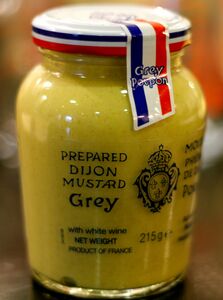Mustard
Mustard is most often used as a condiment on meat, especially cold meats. It is also used as an ingredient in mayonnaise and vinaigrette, in marinades and barbecue sauce. It can also be used as a base for salad dressing when combined with vinegar and/or olive oil. Mustard is a popular accompaniment to hot dogs and Bratwurst.
The edible leaves from the plant the seeds are harvested from can be eaten as mustard greens.
Mustard seeds can be fried in oil to impart their nutty flavour in dishes such as Bombay potatoes.
The following was taken from the wonderful book, Food in England: 'Mustard secret kept'
English mustard was first made at Durham about 1730, and the recipe was kept secret for many years by an old woman named Clements, of Durham.
She ground the seeds like wheat and made a little fortune by going from town to town on a packhorse. She even secured the patronage of George I.
Using mustard powder
Dry mustard, typically sold in tins, is used in cooking and can be mixed with water to become prepared mustard.
Dry mustard powder should always be mixed with cold water prior to mixing with vinegar to avoid destroying the flavour enzymes of the mustard.
-
Mustard powder and seeds
-
Mustard greens with wolfberries
-
Dijon mustard
Dijon mustard
Dijon mustard is not covered by a Protected Designation of Origin (PDO) or a Protected Geographical Indication (PGI) under the auspices of the European Union; thus, while there are major mustard plants in Dijon and suburbs, most Dijon mustard is manufactured outside of Dijon.
Dijon mustard originated in 1856, when Jean Naigeon of Dijon substituted verjuice, the acidic "green" juice of unripe grapes, for vinegar in the traditional mustard recipe.
Mustards from Dijon today generally contain both white wine and burgundy wine; most mustards marketed as Dijon style contain one or both of these wines.
Tewkesbury mustard

The origins of Tewkesbury mustard do not seem to lie in the commercial growing of mustard itself: Yorkshire , Lincolnshire , Cambridgeshire and Essex were all better known for their fields of mustard. It seems probable that a cottage industry grew up from the use of wild mustards in the area. Tewkesbury was certainly known for its spicy trucklement in the 16th century, and was very possibly involved in the trade a hundred years or more before then, perhaps because of its advantageous trading location on the river Severn.
The original product was made of ground mustard seed dried in balls for reconstituting later - some of these balls were gilded to help further in preservation of the oils that gave pungency. At some point horseradish was added to the mustard for extra heat and kick - those who think the British love for spicy foods is recent, are way off the mark. This may have been part of a pattern of what modern food companies would call product development, with herbs included in some mustard balls for different flavours. Further bite would be added to the product when it was made into a paste for the table, with vinegars including spiced vinegars with chilli among the liquids employed.
These days the mustards made in Tewkesbury are artisan products, the industry having gone elsewhere some time ago. What is meant now by Tewkesbury mustard is the spicy mix of mustard and horseradish that can lift a good beef sandwich to greatness.
It is to be hoped that EU bureaucrats don't pay attention to the product for two reasons: it generally does not come from Tewkesbury; and it is not just mustard. Somehow the idea of buying Tewkesbury mustard style product or some similarly vile designation does not appeal. Reference: Information Britain.
You can buy Tewkesbury mustard online at Fortnum and mason
American mustard

Cream salad mustard, yellow mustard (in the US) - American mustard, outside of the United States, is a very mild form of mustard, coloured yellow with turmeric. It is closely associated as a condiment for hot dogs, hamburgers and sandwiches and is usually packaged in a squeezy plastic bottle.
Find recipes that contain 'Mustard'
#mustard #vinegar #hotdogs #mustardgreens #beef #hamburgers #horseradish #vinegars #condiments #mayonnaise #protecteddesignationoforigin


